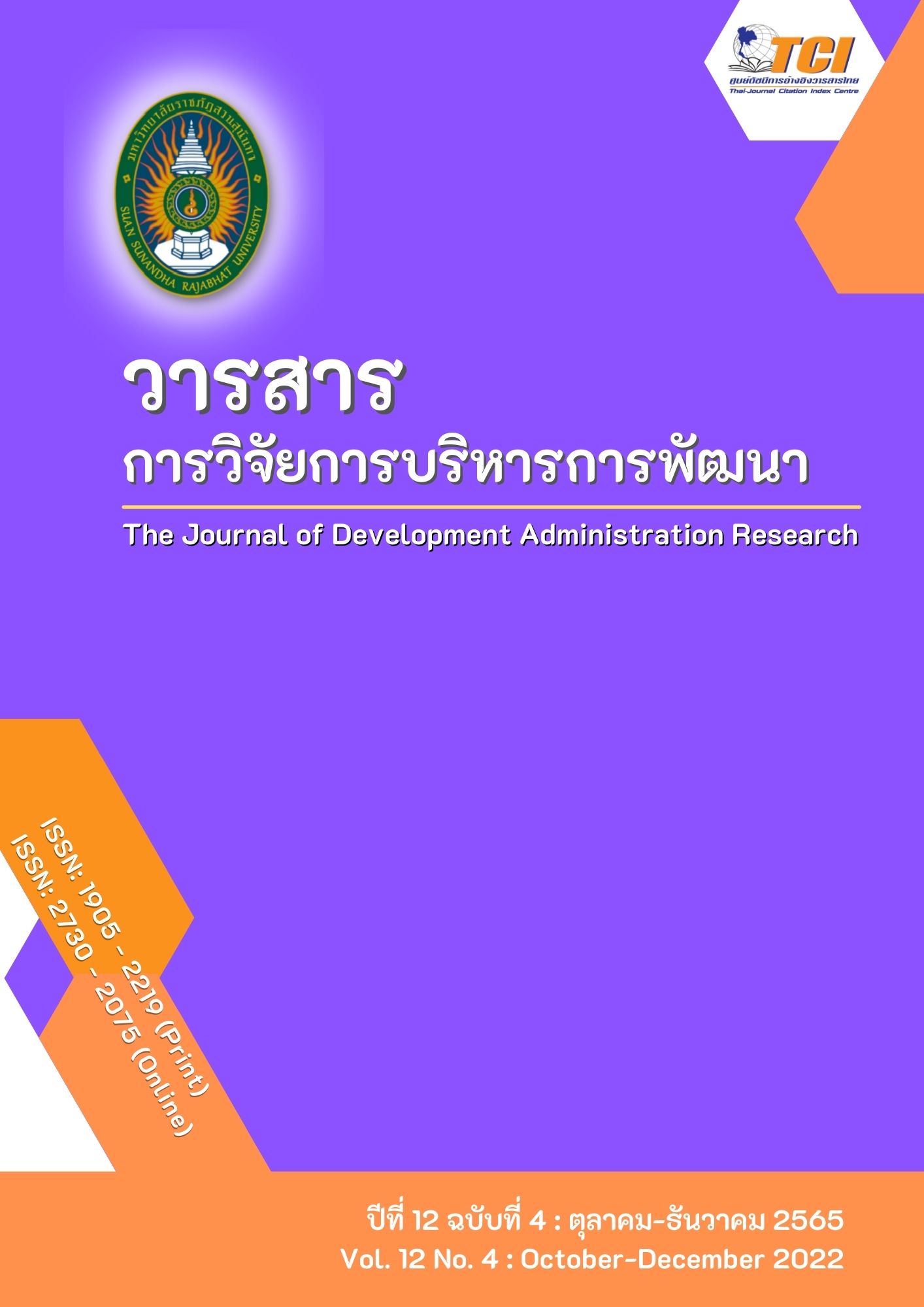ปัจจัยเชิงสาเหตุของนวัตกรรมของธุรกิจที่ส่งผลต่อผลการดำเนินงานของธุรกิจสำหรับฮาร์ดแวร์คอมพิวเตอร์ ซอฟต์แวร์ และบริการด้านดิจิทัลในประเทศไทย
คำสำคัญ:
หลักปฏิบัติงาน, เครือข่ายภายนอก, ความสามารถเชิงพลวัต, นวัตกรรมของธุรกิจ, ผลการดำเนินงานของธุรกิจบทคัดย่อ
บทความนี้มีวัตถุประสงค์ เพื่อ 1) ศึกษาปัจจัยเชิงสาเหตุที่ส่งผลต่อนวัตกรรมของธุรกิจและผลการดำเนินงานของธุรกิจ และ 2) เพื่อสร้างแบบจำลองของปัจจัยเชิงสาเหตุของนวัตกรรมของธุรกิจที่ส่งผลต่อ
ผลการดำเนินงานของธุรกิจ การวิจัยครั้งนี้เป็นการวิจัยเชิงคุณภาพและเชิงปริมาณ เครื่องมือที่ใช้เก็บรวบรวมข้อมูล ได้แก่ แบบสอบถามออนไลน์ สถิติที่ใช้ในการวิเคราะห์ข้อมูล ได้แก่ สถิติเชิงพรรณนาและสถิติวิเคราะห์สมการโครงสร้าง ผลการวิจัยพบว่า หลักปฏิบัติงานโดยเน้นการมีส่วนร่วมส่งผลต่อนวัตกรรมของธุรกิจหลักปฏิบัติงานโดยเน้นการมีส่วนร่วมส่งผลต่อผลการดำเนินงานของธุรกิจ สมรรถนะทางเครือข่ายภายนอกส่งผลต่อนวัตกรรมของธุรกิจ สมรรถนะทางเครือข่ายภายนอกส่งผลต่อผลการดำเนินงานของธุรกิจ ความสามารถเชิงพลวัตส่งผลต่อนวัตกรรมของธุรกิจ ความสามารถเชิงพลวัตส่งผลต่อผลการดำเนินงานของธุรกิจ และนวัตกรรมของธุรกิจส่งผลต่อผลการดำเนินงานของธุรกิจ ฉะนั้น ผู้ประกอบการธุรกิจฮาร์ดแวร์คอมพิวเตอร์ ซอฟต์แวร์และบริการด้านดิจิทัล สามารถมุ่งเน้นการมีส่วนร่วมของพนักงาน โดยการพัฒนาศักยภาพ มอบอำนาจ ตลอดจนมอบแรงจูงใจที่เหมาะสม เพื่อนำไปสู่อิสระทางความคิดและนวัตกรรม
เอกสารอ้างอิง
Asad, M., Shabbir, M., Salman, R., Haider, S., & Ahmad, I. (2018). Do entrepreneurial orientation and size of enterprise influence the performance of micro and small enterprises? A study on mediating role of innovation. Management Science Letters, 8(10), 1015–1026.
Aslam, H., & Azhar, T. M. (2018). Dynamic Capabilities and Performance: A Supply Chain Perspective. Pakistan Journal of Commerce & Social Sciences, 12(1), 198–213.
Bao, H., Lu, K., & Zhu, J. (2015). High-performance human resource management and firm performance: The mediating role of innovation in China. Industrial Management & Data Systems, 115(2), 353–382.
Cheng, C. C. J., & Sheu, C. (2018). Enhancing radical innovation: The interplays of open innovation activities, firm capabilities, and environmental dynamism. Asian Journal of Technology Innovation, 26(3), 369–397.
Chiu, W.-H., Chi, H.-R., Chang, Y.-C., & Chen, M.-H. (2016). Dynamic capabilities and radical innovation performance in established firms: A structural model. Technology Analysis & Strategic Management, 28(8), 965–978.
Dangelico, R. M., Pujari, D., & Pontrandolfo, P. (2017). Green Product Innovation in Manufacturing Firms: A Sustainability-Oriented Dynamic Capability Perspective. Business Strategy & the Environment (John Wiley & Sons, Inc), 26(4), 490–506.
Fernández-Olmos, M., & Ramírez-Alesón, M. (2017). How internal and external factors influence the dynamics of SME technology collaboration networks over time. Technovation, 64–65, 16–27.
Girod, S. J. G., & Whittington, R. (2017). Reconfiguration, restructuring and firm performance: Dynamic capabilities and environmental dynamism. Strategic Management Journal, 38(5), 1121–1133.
Gu, Q., Jiang, W., & Wang, Greg. G. (2016). Effects of external and internal sources on innovation performance in Chinese high-tech SMEs: A resource-based perspective. Journal of Engineering and Technology Management, 40, 76–86.
Jantunen, A., Tarkiainen, A., Chari, S., & Oghazi, P. (2018). Dynamic capabilities, operational changes, and performance outcomes in the media industry. Journal of Business Research, 89, 251–257.
Li, J. yi, Cao, J. xia, & Liu, Y. qin. (2017). A Study on the Effects of Dual Network Embeddedness on Organizational Learning and Internationalization Performance. Eurasia Journal of Mathematics, Science and Technology Education, 13(8), 5519–5529.
Omri, W. (2015). Innovative behavior and venture performance of SMEs: The moderating effect of environmental dynamism. European Journal of Innovation Management, 18(2), 195–217.
Rubel, M. R. B., Kee, D. M. H., Rimi, N. N., & Yusoff, Y. M. (2017). Adapting technology: effect of high-involvement HRM and organisational trust. Behaviour & Information Technology, 36(3), 281–293.
Song, W., Yu, H., & Qu, Q. (2018). High involvement work systems and organizational performance:the role of knowledge combination capability and interaction orientation. The International Journal of Human Resource Management, 32(7), 1–25.
Steinert, C., Landau, C., & Uhlenbruck, N. T. (2020). Causation, Effectuation, and Innovation Performance: The Mediating Role of Absorptive Capacity. Academy of Management Proceedings, 2020(1), 14963.
Vazquez-Bustelo, D., & Avella, L. (2017). The effectiveness of high-involvement work practices in manufacturing firms: Does context matter?. Journal of Management & Organization, 25(2), 1–28.
Wang, L., Li, J., & Huang, S. (2018). The asymmetric effects of local and global network ties on firms’ innovation performance. Journal of Business & Industrial Marketing, 33(3), 377–389.
Williamson, P. J. (2016). Building and Leveraging Dynamic Capabilities: Insights from Accelerated Innovation in China. Global Strategy Journal, 6(3), 197–210.
Wu, F., Mahajan, V., & Balasubramanian, S. (2003). An Analysis of E-Business Adoption and its Impact on Business Performance. Journal of the Academy of Marketing Science, 31(4), 425–447.
Yenyuak, C. (2022). Organizational Creativity Management Affecting the Innovative Model in the Real Estate Business. Business Review Journal,14(1), 448-459.
Zhou, S. S., Zhou, A. J., Feng, J., & Jiang, S. (2019). Dynamic capabilities and organizational performance: The mediating role of innovation. Journal of Management & Organization, 25(5), 731–747.
ดาวน์โหลด
เผยแพร่แล้ว
รูปแบบการอ้างอิง
ฉบับ
ประเภทบทความ
สัญญาอนุญาต
ลิขสิทธิ์ (c) 2022 วารสารการวิจัยการบริหารการพัฒนา

อนุญาตภายใต้เงื่อนไข Creative Commons Attribution-NonCommercial-NoDerivatives 4.0 International License.
บทความที่ได้รับการตีพิมพ์เป็นลิขสิทธิ์ของมหาวิทยาลัยราชภัฏสวนสุนันทา
ข้อความที่ปรากฏในบทความแต่ละเรื่องในวารสารวิชาการเล่มนี้เป็นความคิดเห็นส่วนตัวของผู้เขียนแต่ละท่านไม่เกี่ยวข้องกับมหาวิทยาลัยราชภัฏสวนสุนันทา และคณาจารย์ท่านอื่นๆ ในมหาวิทยาลัยฯ แต่อย่างใด ความรับผิดชอบองค์ประกอบทั้งหมดของบทความแต่ละเรื่องเป็นของผู้เขียนแต่ละท่าน หากมีความผิดพลาดใดๆ ผู้เขียนแต่ละท่านจะรับผิดชอบบทความของตนเองแต่ผู้เดียว




